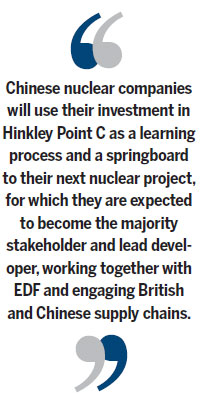Chinese firms looking to work with european companies to build more clean, safe projects in Britain
The British government has ambitions to build a decarbonized economy, and between the 1970s and 2010 has implemented policies to bring this about, such as replacing coal-fired power plants with natural-gas plants and introducing structural changes to the economy to promote energy efficiency.
For a long time, free-market thinking dominated the UK's energy policy, which resulted in a lack of long-term policies to stimulate decarbonization. Realizing the drawbacks of the free market, as well as a lack of long-term commitment by industry players, the government proposed making significant changes and published a white paper in July 2011 on electricity market reform. The four key elements in the EMR were, as follows: Contract for differences, capacity market, carbon price support and emissions performance standards, all of which aimed to achieve the delivery of secure, affordable and low-carbon power supplies.
Electricity produced by nuclear energy plays a key role in the UK's energy supply. Nine nuclear power plants generate about 20 percent of the country's electricity, and in 2012, the installed civil nuclear generation capacity was about 10,000 megawatts.
However, most of the UK's nuclear power plants were built in the 1970s and 1980s, with the exception being Sizewell B, commissioned in 1995. This aging fleet of nuclear power plants therefore needs to be replaced in the next two to three decades.

Supported by the Climate Change Act of 2008 and the Planning Act of the same year, the National Policy Statement for Nuclear Power Generation, published in July 2011, identified eight potentially suitable sites in England and Wales for the development of nuclear power stations: Bradwell, Hartlepool, Heysham, Hinkley Point, Oldbury, Sizewell, Sellafield and Wylfa.
With no nuclear power stations constructed in the past 20 years, coupled with a fragmented industry structure and the global financial crisis, Britain faces challenges in skill, capacity and funding to fulfill its ambitions to deliver a decarbonized energy supply.
In the past few years, EDF, an electric utility company largely owned by the French government, has been in discussions with China General Nuclear Power Group and China National Nuclear Corp for a potential 30 percent investment at Hinkley Point C. In return, the Chinese consortium has requested another site on which they can lead development and construction and apply third-generation Chinese reactor technology.
CGN is the leading clean-energy operator and provider in China. In less than 30 years, it has built 14 nuclear reactors with a total capacity of 14,918 mW. Its first reactor, Daya Bay Unit 1, took seven years to construct. The experience and knowledge of French nuclear technologies gained at the time, as well as the international supply chain, enabled CGN to construct subsequent units within a significantly shorter timeframe - Ling Ao Unit 2 took only five years to compete. In the past decade, CGN has built 10 more reactors with an average construction period of less than six years.
Over the past three decades, CGN has developed a strong track record in delivering civil nuclear projects in China. CGN has 14 reactors under construction, including two that will apply third-generation Chinese reactor technology known as HPR1000. CGN is also building two European reactors manufactured by French company Areva at Taishan, Guangdong province, which are scheduled to go into operation next year. As a clean-energy provider, CGN, which is listed on the Hong Kong Stock Exchange, also generates 8,850 mW electricity from wind, solar and hydro power plants.
CGN is now ready to apply the skills and expertise it has gained in China to construct nuclear power projects in the UK. Yet this is not without its challenges. This is why the company is teaming up with EDF. CGN will join EDF's development team for Hinkley Point C and develop its international expertise through this collaboration.
More importantly, CGN will use British, European, and in some cases, international supply chains to assist them in building clean, safe and high-quality projects in the UK.
Chinese nuclear companies will use their investment in Hinkley Point C as a learning process and a springboard to their next nuclear project, for which they are expected to become the majority stakeholder and lead developer, working together with EDF and engaging British and Chinese supply chains.
I believe this is the right approach to entering the UK's nuclear market, delivering quality and cost-effective projects.
The author is a director in Mott MacDonald's power business. The consultancy is acting as CGN's technical and engineering adviser on its UK nuclear projects.